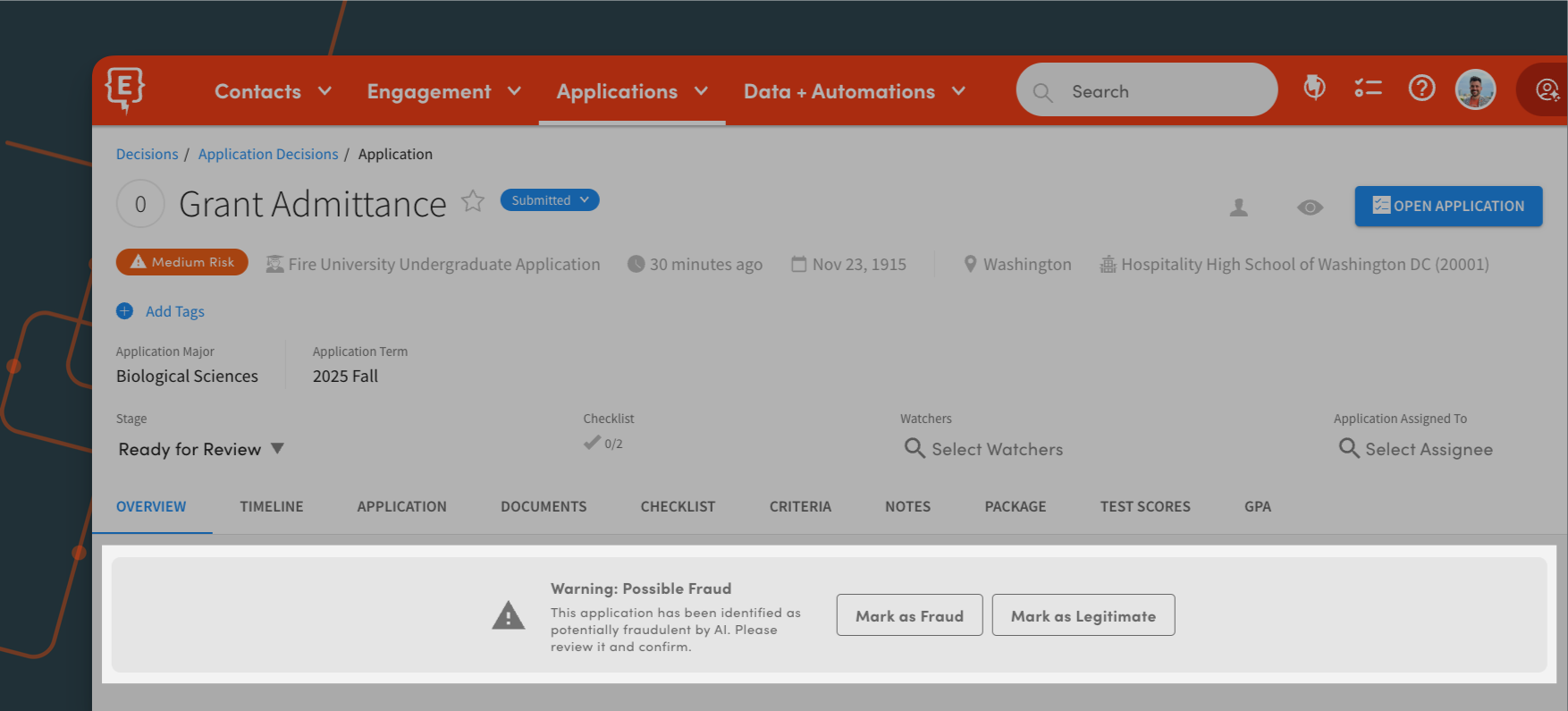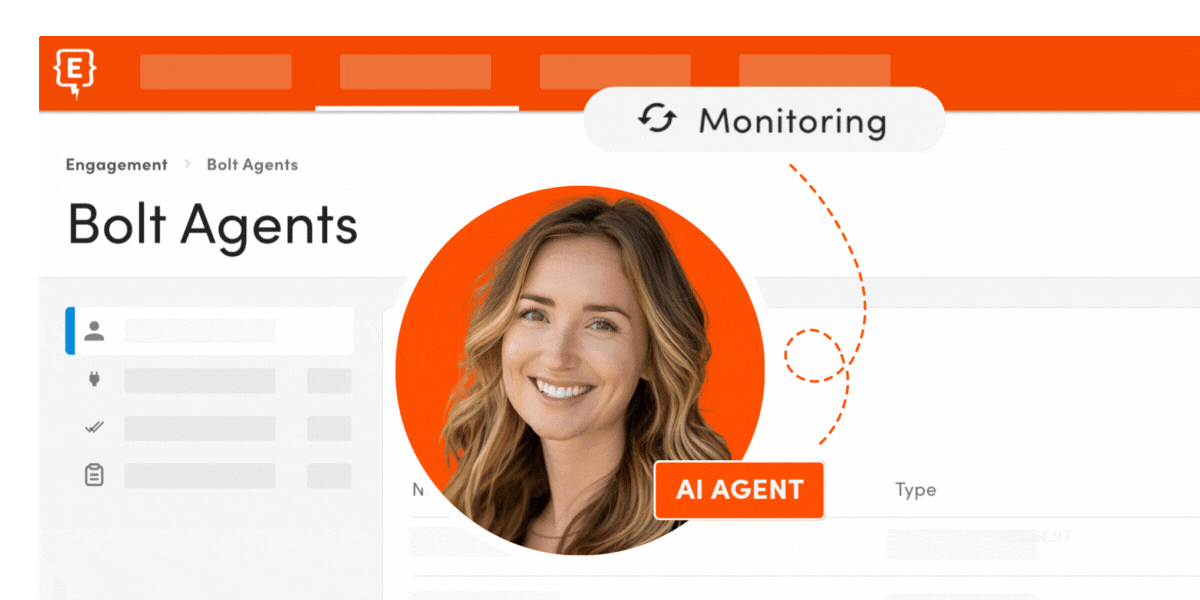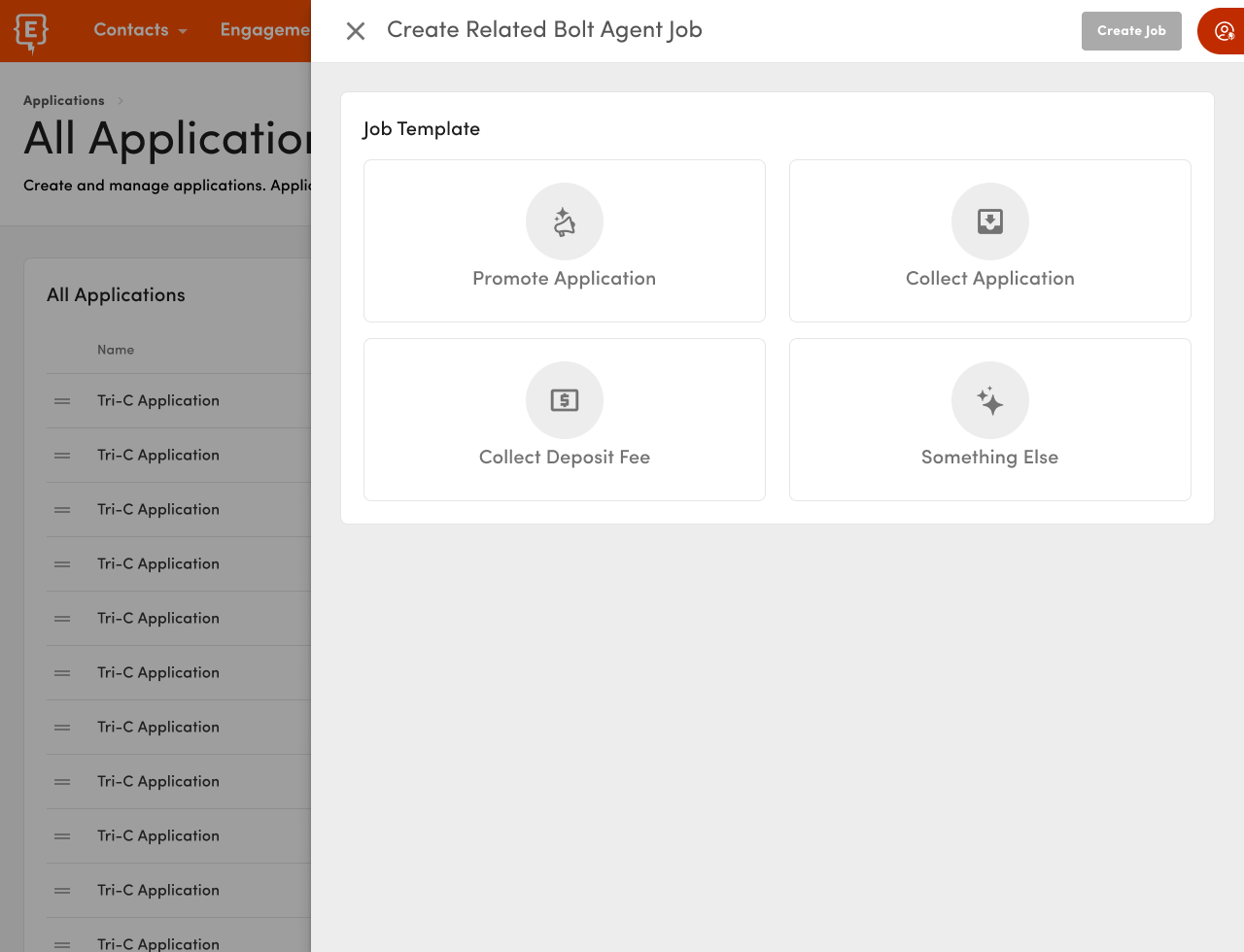Combating College Application Fraud with Element451’s Advanced AI-Powered Detection Solutions
by Ardis Kadiu · Updated Sep 03, 2025

What is Application Fraud in Higher Education and How Does It Impact Colleges?
Application fraud is a growing threat for higher education institutions, with fraudsters exploiting admissions systems to access financial aid, software licenses, and .edu email accounts. Common tactics include falsifying records, submitting AI-generated documents, and creating duplicate identities. These fraudulent actions drain resources, skew data, and put institutional reputations at risk.
Many open-access schools, such as community colleges, are particularly vulnerable. Fraudsters obtain accounts off the dark web or take advantage of automated .edu email generation upon application submission, using these accounts for resale, phishing campaigns, or accessing free software. Others submit falsified applications to obtain financial aid, with no intention of enrolling. This misuse not only affects budgets but also diverts aid away from genuine students.
The Real Impact of College Application Fraud on Schools
Fraudulent applications go beyond wasting time; they affect the institution on multiple levels:
Time and Resource Drain
Every moment spent investigating suspicious applications is time diverted from engaging with real students. This inefficient use of resources puts a heavy strain on admissions staff, resulting in burnout and reduced productivity. It is estimated that admissions staff report spending up to 30% of their time reviewing questionable submissions.
Financial Loss
Fraudsters abuse financial aid programs, draining funds that should benefit deserving students. Institutions report losing thousands of dollars annually to fraudulent claims, forcing stricter policies that impact all applicants.
Skewed Data
Fraudulent applications distort enrollment metrics, leading to ineffective recruitment strategies and wasted marketing budgets.
Reputational Risk
Accepting fraudulent applicants can tarnish an institution's reputation. It affects the trust of students, families, and stakeholders, which can impact future enrollment and community relationships.

Fraud Detection Solutions for College Applications: How Element451 Tackles the Problem
Element451’s AI Fraudulent App Detection, powered by BoltAI, is designed to empower admissions teams to combat fraud without disrupting their workflows. By embedding fraud detection into the CRM, the solution allows admissions teams to prioritize authentic applicants, save time, and focus on engagement.
BoltAI, our AI-based app fraud detection engine, uses a sophisticated reasoning system based on large language models (LLMs) to evaluate various indicators, identifying subtle signals that could suggest fraudulent activity.
Here’s how it works:
1. Timing Indicators
Timing indicators are crucial for college app fraud detection because they help uncover anomalies indicative of automated or coordinated fraud. For example, unusually fast submission times or applications submitted at odd hours can signal the use of bots or organized fraudulent efforts.
- Time to Submit: An application completed in an unusually short time may indicate the use of automated tools. Bot-driven applications are typically far quicker than genuine ones, as real applicants take time to carefully review and refine their information. This helps flag potential automated submissions that bypass the human effort involved in the process.
- Local Submission Time: Submissions made at odd hours in the applicant’s local time can be suspicious. For example, an application submitted at 3 a.m. could suggest fraudulent activity, such as a coordinated submission by fraudsters working across different time zones. Timing anomalies are a key red flag for potential fraud efforts, highlighting applications that do not fit the pattern of a genuine student's behavior.
2. Duplicate Applications
- Number of Duplicate Users: When multiple profiles with minor variations (like slightly different names or email addresses e.g., John.Doe1@example.com and John.Doe2@example.com) are created, it could indicate an attempt to bypass detection systems. Fraudsters often create these near-identical profiles to increase their chances of acceptance or to game financial aid systems.
- Applications from Duplicates: If duplicate accounts submit multiple applications, it’s often a sign of a coordinated effort to flood institutions with fraudulent profiles. This type of behavior is designed to manipulate the admissions process and sometimes involves efforts across several institutions to maximize chances of success.
3. Email Address Analysis
Email analysis for fraud detection in college applications plays a critical role in identifying suspicious behaviors, such as the use of disposable or invalid email addresses, which often indicate fraudulent intent.
- Validity Score: BoltAI assesses the legitimacy of email addresses used in applications, flagging those that appear invalid or suspicious. Fake or low-quality email addresses are often used by fraudsters, making validity checks crucial for weeding out potentially risky profiles.
- Disposable Emails: Fraudsters frequently use disposable or temporary email addresses to evade detection and maintain anonymity. These email addresses are easy to create and abandon, making them a preferred choice for malicious actors trying to exploit the admissions process.
- Bounces and Blocked Access: Emails associated with prior bounces or blocked access are flagged, as they could indicate fake or non-existent accounts. This ensures that admissions teams are not wasting time trying to communicate with non-authentic applicants.
4. IP Address Analysis
- Multiple IPs: Switching between multiple IP addresses during the application process may suggest location masking or several individuals sharing one account. Fraudsters may use this technique to obscure their real location or to appear as different users.
- VPN Detection: VPNs are commonly used to conceal a person’s true location. Our system can detect VPN usage, which often signals an attempt to deceive admissions teams about the applicant's actual whereabouts. This helps institutions focus on applications coming from verifiable, trustworthy locations.
- Location Consistency: We compare the applicant’s IP address location to the provided address information. Major discrepancies between these two can signal deception, such as a fraudster pretending to reside in a country or region to gain admission advantages.
5. Location Analysis
- Distance from Home and School: When there is a significant discrepancy between the IP address and the stated home address or the institution location, it could indicate fraud. This is particularly important when the applicant claims to be applying locally but the IP address originates from a distant location, suggesting they may be misrepresenting their circumstances to manipulate outcomes.
6. Phone Number Analysis
- Phone Validity and Line Type: We validate phone numbers to confirm they are real and active. VoIP (internet-based) numbers are flagged, as they are often easy to obtain and difficult to trace, making them a common choice for fraudsters. Ensuring valid phone numbers helps reduce fraudulent applications and ensures contactability.
- Carrier and Risk Assessment: Some telecom carriers are known to be associated with higher incidences of fraudulent activities. BoltAI assesses the risk linked to each phone number’s carrier, identifying potential red flags that warrant further scrutiny.
- Identity Match: We compare the provided phone number against the applicant's name and address to verify authenticity. Any mismatch could indicate that the applicant is using a phone number that doesn't belong to them, adding to the overall risk score of the application.

Fraud alert. Source: Element451
The Role of AI: Why BoltAI Excels at Fraud Detection
BoltAI, Element451’s LLM-based reasoning engine, provides nuanced, context-aware analysis to detect fraud. For example, BoltAI recently flagged a series of fraudulent college applications where multiple similar email addresses and unusual submission times were overlooked by traditional systems. This college application fraud detection tool enables institutions to catch fraud early, reducing risks and preventing wasted resources. Unlike traditional rule-based systems, BoltAI evaluates every factor holistically, solving cold start problems and swiftly adapting to new fraud tactics.
The AI's balanced assessment approach ensures no single factor unduly influences the fraud score, resulting in fair and accurate evaluations.
How Fraud Detection Works Within Element451's CRM
Element451’s AI Fraudulent App Detection is fully embedded into the CRM, seamlessly integrating fraud checks into the admissions workflow:
- Real-Time Assessment: Applications are assessed as soon as they are submitted, giving admissions teams instant alerts for suspicious activity.
- Centralized System: Built-in fraud detection means institutions don’t need third-party tools, reducing costs and keeping everything in one intuitive platform.
- Flexible Permissions: Admissions staff can easily view, update fraud status, mark applications as legitimate or suspicious, and focus their review process on high-risk submissions.
This seamless integration enables quick responses, providing admissions teams with the insights needed to act effectively.
Enhanced College App Fraud Verification Solutions with AMSA SAFE and Voyatek
While Element451’s AI Fraudulent App Detection offers robust capabilities, some institutions require additional verification layers. We’re compatible with services like AMSA SAFE and Voyatek, offering a streamlined process for integrating further protections without sacrificing usability.
Secure Your Admissions Process Today with Fraud-Free Precision
Fraudulent applications shouldn’t derail your team’s goals. Element451’s AI Fraudulent App Detection provides the tools you need to stay ahead of fraud, protect institutional resources, and maintain trust with students and families.
By leveraging advanced AI and a proactive fraud detection approach, you can protect your institution, prioritize student success, and foster a secure, trustworthy admissions environment. Don't let fraud derail your goals—take action now to secure your admissions process, cut unnecessary costs, and direct your resources where they matter most: serving real students and building an engaged campus community.
Ready to protect your admissions process from fraud? Contact us to schedule a demo today or get more information.

About Element451
Boost enrollment, improve engagement, and support students with an AI-driven CRM and agent platform built for higher ed. Element451 makes personalization scalable and success repeatable.
Categories
New Blog Posts

The Definitive Guide
AI in Higher Education
Bridge the gap between the latest tech advancements and your institution's success.
Useful Links

Talk With Us
Element451 is an AI-driven CRM and AI agent platform for higher education. Our friendly experts are here to help you explore how Element451 can improve outcomes for your school and students.
Get a Demo







